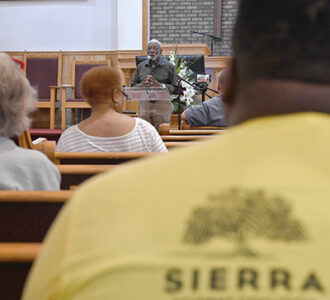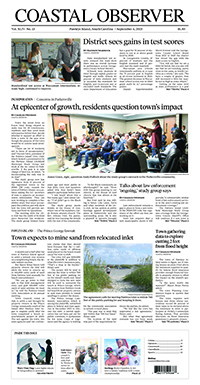Georgetown
Environmental groups offer support to residents in fight over biomass plant

Of the two dozen people who showed up for a meeting to talk about a proposed biomass energy plant in Georgetown, five were from conservation groups. Another five were reporters.
The rest were fewer in number than organizers hoped to draw to the 240-seat Soul Saving Station in Georgetown. It stands in the shadow of the International Paper Co. mill that closed last year.
Last week’s meeting was planned as a follow-up to one held earlier in the month at church. The 60 people who attended were eager to learn more about the biomass plant and its impacts on the county in general and the city’s West End neighborhood in particular.
Everett Carolina, a former County Council member who organized the meetings, said the Memorial Day weekend took its toll on attendance.
“We will be making an effort to mobilize the community,” he said. “We have to get the word out.”
When they do, conservation groups said they will be there to help oppose the facility.
The plant was first pitched to local and state officials in a closed meeting that followed a Chamber of Commerce breakfast with state lawmakers in January. State Sen. Stephen Goldfinch, a lawyer, is also representing the partners who want to redevelop the mill site. They plan to add another boiler to the three already on site that powered the IP mill. That will provide power for a proposed data center, a sawmill and two other wood product operations on the property. It will also sell power to Santee Cooper, according to Goldfinch.
“We stand firmly against the proposal,” said Audrey Jones, coordinator of the state chapter of the Sierra Club. “Georgetown deserves clean, forward-thinking energy solutions.”
The state House unanimously approved a bill this year that defines biomass as “renewable and carbon neutral.” The Senate will take up the measure next year.
“At first, I thought it was a joke,” said Paul Black, who leads the Sierra Club’s Beyond Coal initiative in the state. “This is worse than coal.”
A study by the state of North Carolina found biomass emits four times the amount of carbon dioxide that coal does, said Becky Ryon, north coast director of the Coastal Conservation League.
“It is not a clean form of energy,” she said.
The league and the Sierra Club will join the N.C.-based Dogwood Alliance and the S.C. Environmental Law Project in fighting the biomass plan.
“Yes, we want to see Georgetown grow, but not with the economic program of death and destruction,” said Leo Woodberry, a member of the Dogwood Alliance board.
Another meeting will be scheduled, Carolina said.




